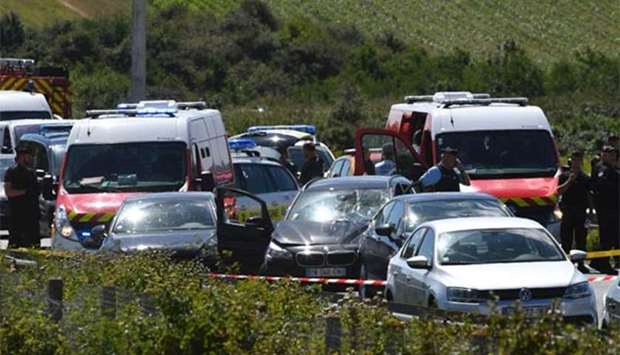French police shot and arrested a suspect in a dramatic motorway chase on Wednesday after a car smashed into soldiers outside a barracks in a Paris suburb, injuring six.
The suspected terror attack on the soldiers is the latest in a string of assaults that have hit France since January 2015, claiming more than 230 lives.The servicemen were hit by a BMW which drove down a quiet street in the upmarket western Paris suburb of Levallois-Perret at around 8:00 am.
It accelerated as it neared the troops, rammed into them and then sped away. Three were shocked and lightly hurt, while the other three sustained more serious injuries which are not life-threatening, officials said.
"I heard a huge crash which I thought was the sound of scaffolding being put up," said Thierry Chappe, an AFP employee who lives in a building opposite the crime scene.
Police later located the vehicle along a motorway near the northern port of Calais.
After a chase, armed officers opened fire, wounding the driver, a man aged in his late 30s who was then arrested, sources involved in the manhunt said, speaking on condition of anonymity.
Pictures showed the black BMW -- rented by the suspect, according to French media reports -- with a crumpled front end and smashed windscreen on the A16 motorway.
Interior Minister Gerard Collomb described the ramming of the soldiers as "deliberate" and carried out by a "man on his own".
He spoke after visiting three of the injured soldiers in hospital along with Defence Minister Florence Parly.
The servicemen were part of the 7,000-strong anti-terrorism Sentinelle force set up in January 2015 after the attacks on the office of Charlie Hebdo.
The armed, uniformed soldiers of the force patrol the streets and guard high-risk areas such as tourist sites and religious buildings.
Collomb said the forces had been attacked on six different occasions since 2015. The country has been under a state of emergency since major attacks in Paris in November 2015.
Some experts believe that patrols should be withdrawn from the streets where they are an obvious target for extremists, but the government is likely to hesitate to do so in case of another major attack.
"The opposition would jump on the argument that 'you've dismantled Sentinelle, there's been an attack and you are to blame'," said Alain Rodier, a specialist from private national security organisation Cf2R.
The Paris prosecutors' office said its anti-terrorism unit has launched a probe into "attempted killings... in relation to a terrorist undertaking".
The Islamic State group (IS) has repeatedly targeted France because of its participation in the US-led international coalition fighting the jihadist group, with French jets carrying out air strikes in Syria.
The incident came just four days after Sentinelle soldiers intervened to control an 18-year-old with a history of psychological problems at the Eiffel Tower where he brandished a knife and shouted "Allahu Akbar".
He told investigators he wanted to kill a soldier, sources close to the case told AFP.
In February, a man armed with a machete attacked four soldiers on patrol at Paris's Louvre Museum, while in April another extremist shot and killed a policeman on the Champs-Elysees, the French capital's most famous boulevard.
In June, a 40-year-old Algerian doctorate student who had pledged allegiance to IS attacked a policeman with a hammer outside Notre Dame cathedral.
The wave of attacks in France has had a serious impact on tourism in the world's top tourist destination, but the industry has begun to recover as incidents have become more widespread and generally less deadly.
Wednesday's attack took place as the new centrist government was holding its last cabinet meeting before the summer holidays.
President Emmanuel Macron publicly clashed with the head of the French armed forces last month over a proposed cut to the military budget this year.
Macron slapped down General Pierre de Villiers, telling him "I'm your boss", after he complained about the impact of the cuts at a time when the army was in action in the Middle East and West Africa as well as at home. De Villiers resigned a few days later.

